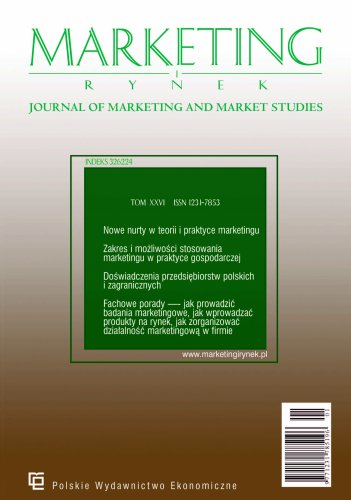The application of CSR and CSV concepts in company marketing activities
Nowadays companies are faced with significant changes in their environment. These relate in particular to changes in the natural environment, related legal regulations, the behaviour of buyers and their growing demands towards product suppliers. Companies are forced to take these trends into account in their marketing strategies. This makes it necessary to consider the application of such concepts as CSR and CSV in their marketing activities. The aim of the publication is precisely an attempt to determine the possibility of applying these concepts in an enterprise's marketing activities. For its implementation the method of critical analysis of domestic and foreign literature relating to these issues was used. The considerations concerned especially the application of the above mentioned concepts in the process of building marketing strategies, their types and used marketing-mix tools. On this basis conclusions were formulated concerning the application of CSR and CSV concepts in the marketing strategies of enterprises. They can be applied especially to the mission of the enterprise, selection of markets, determination of the segment of buyers and marketing-mix tools. Selection of segments of buyers and determination of their needs, especially social needs, will make it possible to create an enterprise's offer in the form of shared economic and social value and to include companies from local markets in its creation.
References
Bibliografia/References
Aakhus, M. i Bzdak, M. (2012). Revitalising the role of Shared Value in the Business-Society Relationship. Business and Professional Ethics Journal, 31(2), 231–246. https://doi.org/10.5840/bpej201231211.
Błach, J., Gorczyńska, M. i Wieczorek-Kosmala, M. (2017). Perspektywa CSR a cel działania przedsiębiorstw — studium na przykładzie wybranych spółek. Annales Universitatis Marie Curie Skłodowska. Oeconomia Sectio H, LI, (4), 25–35. http://dx.doi.org/10.17951/h. 2017.51.4.25.
Buczkowski, B., Dorożyński, T., Kuna-Marszałek, A., Serwach, T. i Wieloch, J. (2016). Społeczna Odpowiedzialność Biznesu. Studium przypadków firm międzynarodowych. Łódź: Wydawnictwo Uniwersytetu Łódzkiego.
Chan Kim, W. i Mauborgne, R. W. (2005). Strategia błękitnego oceanu. Warszawa: Wydawnictwo MT Biznes.
Czubała, A. (2013). Koncepcja i formy marketingu społecznego przedsiębiorstw. Zeszyty Naukowe Małopolskiej Wyższej Szkoły Ekonomicznej w Tarnowie, 22(1), 25–34.
Dietl, J. (1986). Marketing. Warszawa: PWE.
Drążek, Z. i Niemczynowicz, B. (2003). Zarządzanie strategiczne przedsiębiorstwem. Warszawa: PWE.
Fonfara, K. (1999). Marketing partnerski na rynku przedsiębiorstw. Warszawa: PWE.
Garbarski, L., Rutkowski, I. i Wrzosek, W. (1998). Marketing. Warszawa: PWE.
Grzegorczyk, W. (2013). Marketing na rynku międzynarodowym. Warszawa: Woters Kluwer.
Grzegorczyk, W. (2021). Links between the creating shared value concept and a company's marketing strategy. Acta Scientiarum Polonorum. Oeconomia, 19(4), 51–58. https://doi.org/10.22630/ASPE. 2020.19.4.40.
Janeczek, U. (2014). Koncepcja społecznej odpowiedzialności biznesu a marketing relacji. Studia Ekonomiczne Uniwersytetu Ekonomicznego w Katowicach, 182, 30–41.
Kang, S. i Na, Y. K. (2020). Effects of Strategy Characteristics for Sustainable Competitive Advantage in Sharing Economy Businesses on Creating Shared Value and Performance. Sustainability, 12, 1397, 1–21. https://doi.org/10.3390/su12041397.
Kotler, P. i Trias de Bes, F. (2003). Lateral Marketing — New Techniques for Finding Breakthrough Ideas. New Jersey: John Wiley & Sons Inc.
Kozłowski, W. (2008). Cause-related marketing w badaniach naukowych w praktyce biznesowej. Marketing i Rynek, (6), 9–14.
Kramer, M. i Pfitzer, M. W. (2016). The ecosystem of shared value. Harvard Business Review, 9, 80–89.
Krzepicka, A. i Tarapata, J. (2013). Strategia CSR, czyli tworzenie wspólnej wartości. Prace Naukowe Uniwersytetu Ekonomicznego we Wrocławiu, 288, 5–18. https://dx.doi.org/10.29119/1899-6116.2020.52.1.
Lambin, J. J. (2001). Strategiczne zarządzanie marketingowe. Warszawa: Wydawnictwo Naukowe PWN.
Lenskold, D. (2004). Pomiar rentowności inwestycji marketingowych. Warszawa: Wolters Kluwer.
Mączyńska, E. (2011). Miary finansów przedsiębiorstwa i ich adekwatność. Prace Naukowe Uniwersytetu Ekonomicznego we Wrocławiu, 172, 388–402.
Mehera, A. R. (2017). Shared Value Literature Review: Implications for Future Research from Stakeholder and Social Perspective. Journal of Management and Sustainability, 7(4), 98–111. http://doi.org/10.5539/jms.v7n4p98.
Mirvis, P. i Goggins, B. (2006). Stages of Corporate Citizenship. California Management Review, 48(2), 104–126. https://doi.org/10.2307/41166340.
Moon, H-C., Parc, J. (2019). Shifting Corporate Social Responsibility to Corporate Social Opportunity through Creating Shared Value. Strategic Change, 28(2), 115–122. https://doi.org/10.1002/jsc.2252.
Moon, H-C., Parc, J., Yim, S. H. i Park, N. (2011). An Extension of Porter and Kramer's Creating Shared Value (CSV): Reorienting Strategies and Seeking International Cooperation. Journal of International and Area Studies, 18(2), 49–64.
Niedzielska, A. (2011). Marketing 3.0 w przedsiębiorstwie jutra (Sustainble enterprice). Zeszyty Naukowe Uniwersytetu Szczecińskiego. Ekonomiczne Problemy Usług, 74, 387–399.
Nowacki, F. (2014). Marketing 4.0 — nowa koncepcja w obliczu przemian współczesnego konsumenta. Marketing i Rynek, (6), 11–19.
Otto, J. (2004), Marketing relacji. Koncepcja i stosowanie. Warszawa: Wydawnictwo C.H.Beck.
Pfitzer, M., Bockstette, V. i Stamp, M. (2013). Innovating for shared value. Harward Business Review, 91, 100–107.
Porter, M. E., Hills, G., Pfitzer, M., Patscheke, S. i Hawkins, E. (2012). Measuring Shared ValueHow to Unlock Value by Linking Social and Business Results. HBR, FSG.
Porter, M. E. i Kramer, M. E. (2011). Creating Shared Value. How to reinvent capitalism and unleash a wave of innovation and growth. Harvard Business Review, 89(1), 62–77.
Rogoziński, K. (1998). Nowy marketing usług. Poznań: Wydawnictwo Uniwersytetu Ekonomicznego w Poznaniu.
Roztocka, K. (2018). CSR w kreowaniu wizerunku marki. Refleksje, 18, 221–236. https://dx.doi.org/10.14746/r.2018.2.15.
Sojkin, B. (2003). Zarządzanie produktem. Warszawa: PWE.
Szajca, D. (2017). Kreowanie innowacji społecznych w kontekście budowania reputacji przedsiębiorstwa. Zeszyty Naukowe Politechniki Śląskiej. Seria Organizacja i Zarządzanie, 114, 477–490. http://dx.doi.org/10.29119/1641-3466.2018.114.38.
Urbanowska-Sojkin, E. i Weinert, A. (2016). Rozwój koncepcji CSV na kanwie krytyki Społecznej Odpowiedzialności Biznesu. Przegląd Organizacji, (6), 31–36.
Visser, W. (2012). The future of CSR: Towards transformative CSR, or CSR 2.0. Kaleidoscope Futures Paper Series, 1, 1–17. https://dx.doi.org/10.2139/ssrn.2208101.
Witek-Crabb, A. (2016). Ewolucyjne modele CSR — przegląd koncepcji społecznej odpowiedzialności biznesu. Zarządzanie strategiczne w teorii i praktyce. Prace Naukowe Uniwersytetu Ekonomicznego we Wrocławiu, 444, 541–558. http://dx.doi.org/10.15611/pn.2016.444.48.
Wrzosek, W. (2004). Strategie marketingowe. Warszawa: PWE.
Żychiewicz, M. (2015). Społeczna odpowiedzialność biznesu jako strategia prowadzenia działalności polskich przedsiębiorstw. Zeszyty Naukowe Uniwersytetu Szczecińskiego. Współczesne Problemy Ekonomiczne. Globalizacja. Liberalizacja. Etyka, 11, 281–289. http://dx.doi.org/DOI%3A10.18276/wpe.2015.11-01.

